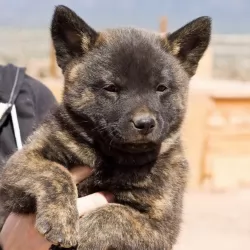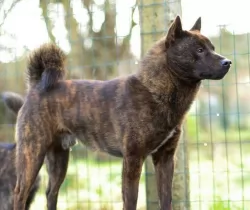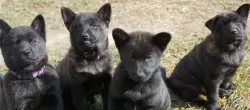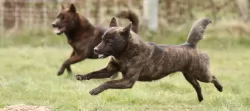 MyDogBreeds
MyDogBreeds Kai Ken is originated from Japan but Bichonpoo is originated from Australia. Kai Ken may grow 21 cm / 9 inches higher than Bichonpoo. Kai Ken may weigh 14 kg / 31 pounds more than Bichonpoo. Both Kai Ken and Bichonpoo has almost same life span. Both Kai Ken and Bichonpoo has almost same litter size. Kai Ken requires Moderate maintenance. But Bichonpoo requires High maintenance
Kai Ken is originated from Japan but Bichonpoo is originated from Australia. Kai Ken may grow 21 cm / 9 inches higher than Bichonpoo. Kai Ken may weigh 14 kg / 31 pounds more than Bichonpoo. Both Kai Ken and Bichonpoo has almost same life span. Both Kai Ken and Bichonpoo has almost same litter size. Kai Ken requires Moderate maintenance. But Bichonpoo requires High maintenance
 The Kai Ken dog hails from Japan and is both an ancient and rare dog. In fact the dog was discovered in 1929 in the Kai province near Mount Fuji. The dog has the nickname Tora Inu in Japan which means 'Tiger Dog'. Maybe its got to do with the brindle striped coat or his bravery.
The Kai Ken dog hails from Japan and is both an ancient and rare dog. In fact the dog was discovered in 1929 in the Kai province near Mount Fuji. The dog has the nickname Tora Inu in Japan which means 'Tiger Dog'. Maybe its got to do with the brindle striped coat or his bravery.
He falls into the working class category. In 1931, the Kai Ken Aigokai registry was formed to preserve the dog. In fact in this year Dasuke Adachi discovered these dogs and in 1934 was actually designated a Natural Monument in Japan and also protected by law.
The Kai Ken was recognized in 1934 by the Japanese Kennel Club. It is not 100% certain but it is thought that the dog was brought to the United States in the 1950s.
 This popular little dog was developed by crossing the Poodle with the Bichon Frise to create the Bichonpoo. They are also called the Poochon and sometimes called the Birchpoo. They are a soft, curly breed and they are extremely cute – a very cuddly breed. They are not recognized by the AKC, CKC or the UKC. Some other kennel clubs do accept them and welcome them into obedience and agility trials. The breed was originally developed in Australia as a household pet for those who want a “curly lap dog” that was hypoallergenic, did not shed and had a great temperament for life in families with children. They were first developed in the latter part of the 20th century.
This popular little dog was developed by crossing the Poodle with the Bichon Frise to create the Bichonpoo. They are also called the Poochon and sometimes called the Birchpoo. They are a soft, curly breed and they are extremely cute – a very cuddly breed. They are not recognized by the AKC, CKC or the UKC. Some other kennel clubs do accept them and welcome them into obedience and agility trials. The breed was originally developed in Australia as a household pet for those who want a “curly lap dog” that was hypoallergenic, did not shed and had a great temperament for life in families with children. They were first developed in the latter part of the 20th century.
 The Kai Ken has always been used for hunting purposes. He comes as recommended for hunting people and those who are active.
The Kai Ken has always been used for hunting purposes. He comes as recommended for hunting people and those who are active.
It is a medium sized dog standing at between 43 to 56cm in height both male and female and weighing between 14 and 22kg.
The ears of the dog are erect, the muzzle is fairly tapered and the nose is black. The tail is bushy like that of a fox and curls over the back. The double coat of the dog is of medium length and harsh and is a brindle color in a reddish or black shade.
Puppies are born black and then the brindle stripe-like pattern comes in later. He has an athletic body and is a keen swimmer.
The Kai Ken is an intelligent dog, loyal to his human family while being somewhat reserved around strangers. They are amicable with both children in the home as well as other pets.
He is a friendly, intelligent dog, forming close bonds with his family. Have him trained and socialized and he'll make you a splendid pet who will be willing to guard you if anyone threatens.
One look at that bright face and you can see that he is an intelligent, independent dog. He is also courageous and fearless and makes a great watchdog, especially because he is naturally reserved and suspicious with strangers.
 This Bichon Frise-Poodle cross is a small dog with big personality. The original hybrid is 50% Poodle and 50% Bichon Frise. This is considered a first-generation hybrid. The second-generation hybrid is 50% Bichonpoo and 50% purebred Bichon Frise or Poodle. Then third generation hybrids are a cross between two second generation dogs. There is no fourth generation and most breeders do not offer even a third generation. The original hybrid can be healthier than the parents, but any flaws tend to show up in 2nd generation hybrids and it gets worse with third generation. This dog should be hardy, well-proportioned and robust. They are small, sweet and sturdy. Because there are three different sizes of Poodles, there can be three different sizes of the Bichon Poo – Standard, Mini and Toy.
This Bichon Frise-Poodle cross is a small dog with big personality. The original hybrid is 50% Poodle and 50% Bichon Frise. This is considered a first-generation hybrid. The second-generation hybrid is 50% Bichonpoo and 50% purebred Bichon Frise or Poodle. Then third generation hybrids are a cross between two second generation dogs. There is no fourth generation and most breeders do not offer even a third generation. The original hybrid can be healthier than the parents, but any flaws tend to show up in 2nd generation hybrids and it gets worse with third generation. This dog should be hardy, well-proportioned and robust. They are small, sweet and sturdy. Because there are three different sizes of Poodles, there can be three different sizes of the Bichon Poo – Standard, Mini and Toy.
 The Kai Ken is a working- and hunting dog, so he is used to being active and will want a home where he can be played with and exercised regularly.
The Kai Ken is a working- and hunting dog, so he is used to being active and will want a home where he can be played with and exercised regularly.
He can be slightly stubborn and independent so training and socialization are imperative. This is also because the dog’s curiosity and his athletic skills can lead to trouble if he isn’t properly trained.
Treat him the way he deserves and you’ll see that he is able to develop a strong bond with you and be altogether an excellent family pet.
 The Bichonpoo is affectionate, intelligent and active just as you might expect from a Poodle/Bichon Frise cross. He loves people and lives well with other animals. He is particularly fond of children and loves to play with gentle older children. However, the temperament and characteristics of the hybrid are not as predictable as their parents. The characteristics of the Bichonpoo depends upon its lineage – if it is first generation, second generation or third generation. With each successive generation there is less predictability in the characteristics of the individual dog. Regardless of generation, the Bichonpoo will need exercise and mental stimulation. They are loving, good-natured and accommodating to their environment. They want to be with their owner and can get very attached.
The Bichonpoo is affectionate, intelligent and active just as you might expect from a Poodle/Bichon Frise cross. He loves people and lives well with other animals. He is particularly fond of children and loves to play with gentle older children. However, the temperament and characteristics of the hybrid are not as predictable as their parents. The characteristics of the Bichonpoo depends upon its lineage – if it is first generation, second generation or third generation. With each successive generation there is less predictability in the characteristics of the individual dog. Regardless of generation, the Bichonpoo will need exercise and mental stimulation. They are loving, good-natured and accommodating to their environment. They want to be with their owner and can get very attached.
Depending on their parents they can be anxious and high strung like the Poodle or nippiness and ‘small dog syndrome’ of the Bichon Frise. Separation anxiety can be a major issue with this breed. Do not let your Bichonpoo become dominate in your home or they will assume the alpha position and become very bossy, especially with children. He is easy to train and a good watchdog as well.
 With a lifespan of 14 to 16 years, and given the genetic purity of the Kai Ken, you aren't likely to battle with congenital health problems with your dog, but it is always good to be aware of certain minor health issues that he could succumb to.
With a lifespan of 14 to 16 years, and given the genetic purity of the Kai Ken, you aren't likely to battle with congenital health problems with your dog, but it is always good to be aware of certain minor health issues that he could succumb to.
He can suffer from a few common dog diseases such as progressive retinal atrophy or hip dysplasia.
This is a disease of the eye where there is wasting of certain parts, and in this case the cells of the retina develop abnormally. This can eventually lead to blindness. It’s an inherited disease that can occur in pure- and mixed breeds, and dogs with PRA shouldn’t be used for breeding.
It isn’t a painful condition, and the first symptom usually noticed in a dog is night blindness where you may notice him bumping into things at night and being reluctant to walk around in the dark.
 The Bichonpoo is usually healthier than either the Poodle or the Bichon Frise. At the same time, they could inherit any of health concerns of either of their parents in the first generation Bichonpoo. They are however likely to develop ear infections and skin allergies. Cleaning and grooming is essential, especially the ears, but also to prevent matting which could lead to skin infections.
The Bichonpoo is usually healthier than either the Poodle or the Bichon Frise. At the same time, they could inherit any of health concerns of either of their parents in the first generation Bichonpoo. They are however likely to develop ear infections and skin allergies. Cleaning and grooming is essential, especially the ears, but also to prevent matting which could lead to skin infections.
 Even though the coat is thick, the Kai Ken will require basic canine care, so a brush twice a week will be enough to keep the coat free of loose hair. He sheds more heavily a couple of times a year and then he will require more brushing.
Even though the coat is thick, the Kai Ken will require basic canine care, so a brush twice a week will be enough to keep the coat free of loose hair. He sheds more heavily a couple of times a year and then he will require more brushing.
He has always been used to hunt so he is a dog that will require regular exercise such as walks, hikes, swimming and ball games.
The nails of the dog should be trimmed regularly once they become long as long nails can be hazardous and can hook onto things, causing injury to the nail area.
The ears of the dog should be checked regularly for fleas and ticks, and teeth should also be brushed with canine toothbrush and toothpaste.
 The Bichonpoo is an energetic little dog and needs enough nutrition to keep up with his needs. Feed a Bichonpoo at least twice a day – small meals- and dry food because of dental issues. A high-quality food will help to prevent allegories.
The Bichonpoo is an energetic little dog and needs enough nutrition to keep up with his needs. Feed a Bichonpoo at least twice a day – small meals- and dry food because of dental issues. A high-quality food will help to prevent allegories.
The Bichonpoo is the product of the poodle who is prone to bloat and Addison’s Disease and the Bichon Frise who is susceptible to Patella luxation, progressive retinal atrophy and liver shunts. The first generation Bichonpoo should be free of these health concerns. You should be aware that there is a possibility that the first-generation hybrid could contract any of its parents’ illnesses or deficiencies.
This hybrid is a high energy dog and needs daily exercise in the form of walks and play. They have the intelligence and skill of the Poodle with the energetic desire to play of the Bichon Frise. They need toys and a person to play with. She will need to be both mentally and physically stimulated. If she gets bored she will become destructive and noisy with barks and whines.